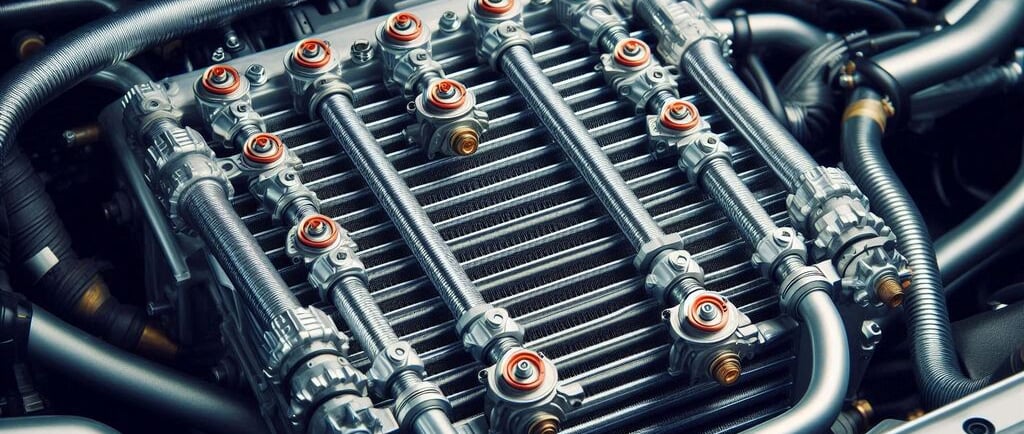Radiator: Dissipates heat from the engine coolant.
Keeping your car's engine cool is crucial to its performance and lifespan, and that’s exactly where the radiator comes in.
COOLING SYSTEMS
11/11/20244 min read


How the Radiator Dissipates Heat from the Engine Coolant and Protects Your Engine
Keeping your car's engine cool is crucial to its performance and lifespan, and that’s exactly where the radiator comes in. This vital component plays a key role in dispersing heat generated by the engine to maintain optimal operating temperatures. In this article, we’ll dive into how radiators dissipate heat from the engine coolant, why it’s important, and some tips to keep your cooling system in top shape.
Why is the Radiator Important?
When you drive, the engine’s internal combustion process generates significant heat. If left unchecked, this heat could damage engine parts or lead to complete engine failure. The radiator, working with the engine coolant, dissipates this heat and prevents overheating.
In essence, the radiator is the heart of the engine cooling system. But how exactly does it work? Let’s take a closer look.
How Does a Radiator Dissipate Heat?
1. Coolant Circulation Through the Engine
First, coolant (a mix of water and antifreeze) is pumped through channels in the engine. As it circulates, it absorbs heat from the engine block. The now-hot coolant then flows to the radiator for cooling.
2. Heat Dissipation in the Radiator
Once the heated coolant reaches the radiator, it flows through a series of thin metal tubes, which increase the surface area exposed to the surrounding air. These tubes are connected to cooling fins—small metal pieces that conduct heat away from the tubes, allowing the coolant to cool down more efficiently.
3. Airflow and Heat Exchange
The radiator’s cooling process is enhanced by airflow. As you drive, air flows through the front grill of your vehicle and across the radiator fins, helping to release the heat from the engine coolant. This airflow can be natural from driving, or assisted by electric fans that kick in when the car is idling or moving slowly.
Common Radiator Issues
Over time, your car’s radiator can encounter some issues that may affect its performance. Here are a few common problems and how to spot them:
1. Clogged Radiator
Debris, dirt, and rust can accumulate inside the radiator over time, restricting coolant flow. This blockage prevents the radiator from properly dissipating heat, leading to potential overheating. If you notice your car running hotter than usual, a clogged radiator might be the culprit.
Solution: Regularly flush your radiator to keep it clean and free of build-up. Many experts recommend flushing the radiator every 30,000 miles or following the car manufacturer's maintenance schedule.
2. Leaking Radiator
Leaks in the radiator can reduce the coolant levels, making it difficult for the engine to stay cool. You might notice coolant puddles under your car or see low coolant levels on your dashboard.
Solution: Inspect the radiator and hoses regularly for visible signs of wear and tear, cracks, or leaks. Address any leaks immediately to prevent damage to the engine.
3. Faulty Radiator Fan
The radiator fan helps move air through the radiator when your car is idle or moving at low speeds. If this fan isn’t working correctly, the radiator won’t dissipate heat as effectively, potentially leading to overheating.
Solution: Have your fan inspected by a mechanic if you notice your car running hot while idling or in slow traffic.
Radiator Maintenance Tips
Keeping your radiator in good condition is key to preventing overheating and extending your engine’s life. Here are a few tips to help you maintain your radiator and cooling system:
Check Coolant Levels Regularly: Low coolant levels make it harder for your radiator to cool the engine. Keep coolant at the recommended levels and top off as needed.
Inspect Hoses and Connections: Ensure all radiator hoses are intact and free from cracks or leaks. Loose hose connections can also lead to coolant leaks.
Flush the Radiator: As mentioned, flushing your radiator every 30,000 miles can help remove contaminants that may have built up over time.
Check for Rust and Corrosion: Rust can clog the radiator and reduce its cooling efficiency. Rusty coolant is a sign of corrosion in the system and should be addressed promptly.
Keep the Radiator Clean: Ensure the radiator’s surface is clean, as dirt and debris can restrict airflow and reduce heat dissipation. Clean the radiator fins gently with compressed air or a soft brush if you notice any buildup.
The Role of Radiators in Different Vehicles
Radiators aren’t just found in cars—they’re in trucks, motorcycles, and even some high-performance computers! In vehicles, radiators are particularly important in off-road or performance cars, which generate more heat and need highly efficient cooling systems. Similarly, radiator technology has advanced to include materials like aluminum, which is lighter and has excellent heat-dissipation properties.
In trucks and heavy-duty vehicles, radiators are designed to cool engines that work at higher capacities for extended periods. Proper maintenance for radiators in these vehicles can improve their durability and performance, reducing downtime and costly repairs.
Summary
Radiators are essential components of any vehicle’s cooling system, helping to dissipate heat from the engine coolant and keep temperatures under control. Regular maintenance—like checking coolant levels, flushing the radiator, and inspecting hoses—can keep your radiator functioning properly and prevent common issues like clogs, leaks, and overheating.
Key Takeaways
The radiator dissipates heat by circulating coolant and releasing it through metal fins.
Common radiator issues include clogs, leaks, and faulty fans.
Regular radiator maintenance can prevent overheating and extend your engine’s lifespan.
Radiators keep your engine cool, but it’s your job to keep the radiator in shape! By following the tips above, you can ensure your cooling system remains reliable. If you have any questions about radiator care or want to learn more about car maintenance, feel free to leave a comment below or check out our related articles.
For related articles, you might enjoy reading our Car Maintenance 101 or How to Spot and Fix Coolant Leaks. Proper radiator care can make all the difference in your car's performance, so don’t overlook this vital component!


